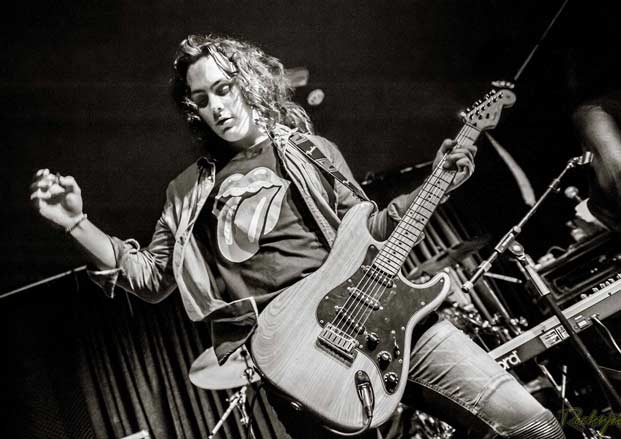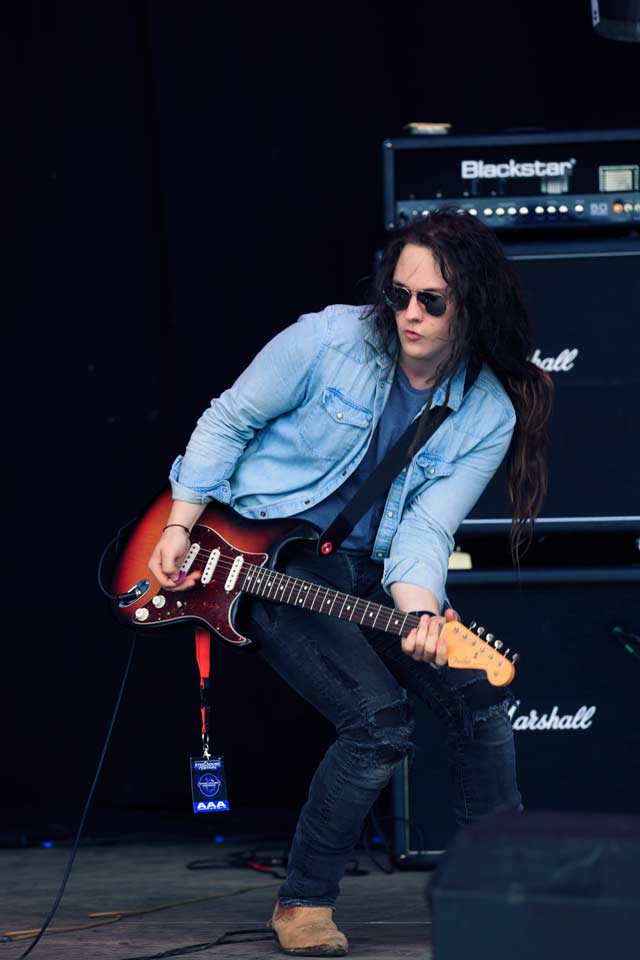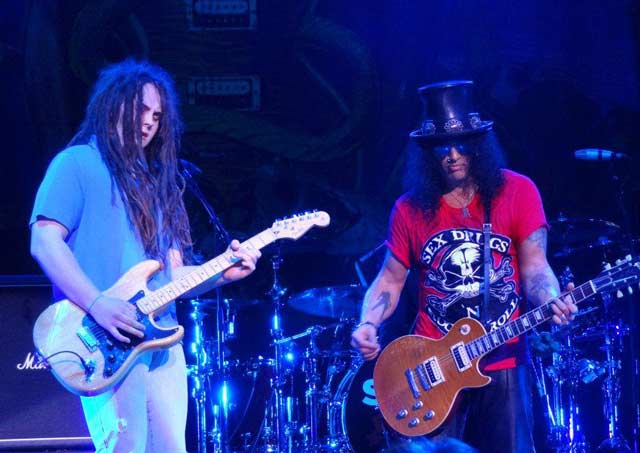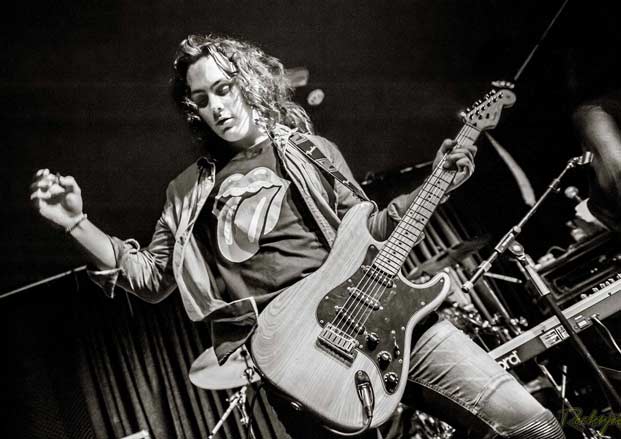Blues-Rock Phenom Chris Buck Talks Jamming with Slash and What’s on Tap for Buck & Evans

When Guitar World rings rising blues-rock talent Chris Buck, the 26-year-old South Wales native has just returned from London’s Stone Free Festival, where Buck & Evans played alongside such rock heavyweights as Ritchie Blackmore’s Rainbow and Blue Oyster Cult. In fact, Buck & Evans, a four-piece unit led by Buck’s searing, stinging licks and vocalist/keyboardist Sally Ann Evan’s heavens-shaking howl, have been lighting up stages across the U.K. for several years now, both at their own incendiary gigs and at major British events like the Download Festival, where they performed in 2016.
With any luck, American audiences will soon know what U.K. music fans—not to mention bona fide guitar heroes like Slash, who has called Buck a “fucking awesome guitar player”—already do: Chris Buck is a six-string star.
Furthermore, Buck & Evans are the real blues-rock deal, with a fresh—not to mention deep and diverse—sound that recalls classic acts from Cream, Free and John Mayall & the Bluesbreakers to Peter Green-era Fleetwood Mac, Janis Joplin and Led Zeppelin. Meaning, essentially, that while Buck & Evans are a crack unit of top-notch musicians, they also are conscious of always placing melody, groove and soul above shred and other show-off moves.
The result is that B&E are plying some of the most vibrant and powerful blues-rock going, as can be heard on efforts like their self-titled 2013 EP and 2014’s Live at Rockfield.
Buck & Evans, which also includes bassist Dominic Hill and drummer Bob Richards (who filled in for AC/DC in 2014), are getting set to record their debut full-length. In the meantime, the incredibly affable Buck took a few moments to chat with Guitar World about his influences, his gear and what it was like to share the stage with one of his guitar idols, Slash. Buck also discussed the future of Buck & Evans, as well as how he feels about carrying the blues-rock torch in the 21st century.
“I’ve never even given it a moment’s thought as far as whether what I’m doing is popular or in vogue, or whether we’re trying to capture some zeitgeist of the moment,” he says matter-of-factly. “It’s always been just, ‘Do what you love.’ ”
You just got back from performing at the Stone Free Festival in London. How was that?
Really good. It was spread across three stages at the O2 Arena. It was a fantastic turnout. And if nothing else, I can say I played a gig at the O2. Strike one off the bucket list!
Get The Pick Newsletter
All the latest guitar news, interviews, lessons, reviews, deals and more, direct to your inbox!
And you can also say you’ve played with Ritchie Blackmore.
Yeah. And if anyone asks, we were supporting him. You don’t necessarily have to look at the fine print on the poster to see where we were on the bill! [laughs] I grew up more of a Deep Purple fan than a Rainbow fan, but it was a thrill. The band sounded great.
Was Blackmore a big influence on you as a guitarist?
He was. [Deep Purple’s] In Rock and Machine Head were two particularly formative albums that always seemed to be on when I was a kid. And that whole kind of harmonic-minor thing Blackmore does, that more Eastern sound, was like nothing I’d ever heard at that point. So, yeah, a big influence on me growing up.
What was some of the music that inspired you as a kid?
I think the first sort of guitar album that I remember getting into was Eric Clapton with John Mayall & the Bluesbreakers. The “Beano” album. I remember being absolutely infatuated with that, and just spending countless hours in my room trying to do whatever it was Clapton was doing on that record. Those years when you’re a kid, it’s the most exciting period in your life, that age, because everything is new. You have an entire back catalog of Led Zeppelin to explore. Deep Purple, Guns N’ Roses, all these incredible bands that are there entirely for the taking. You’ve never heard any of it before. There’s that initial kind of year or so where you’re just discovering new music every day, and it’s phenomenal. I kind of wish I could recapture that enthusiasm you have when you’re 14, 15 years old and literally everything is new and unknown.
Is there one guitarist who shaped your path more than any other player?
I think the first guitar player I really latched onto to at the level where I totally wanted to emulate everything he did was Slash. From Guns N’ Roses to everything post that—Velvet Revolver, Slash’s Snakepit. I wanted to have the low-slung Les Paul, the stack of Marshalls, all of it. So Guns were the first band I got into in a really big way. At some point in my life I had a copy of pretty much every bootleg from every show that was available. From there I kind of worked my way back to Zeppelin and reverse through the Seventies, and then the Sixties.
Actually, rediscovering Hendrix was kind of a big one for me. Because Hendrix was one of the ones who initially didn’t do a massive amount for me. I think in hindsight I found him sloppy and maybe a little bit showy. Everyone with Hendrix instantly latches onto, you know, the playing with the teeth, the playing behind the head, the setting the guitar on fire. But his rhythm playing is immense. It flies under the radar a little bit because of the showmanship he’s known for. But if you listen to the rhythm stuff he’s doing, it’s mind-blowing. That lyrical, fluid thing…it’s almost a solo in itself.
Mixing the melody with the root notes and that kind of stuff, it’s just gorgeous. And he’s doing it while he’s singing! It’s kind of that patting your head and rubbing your stomach at the same time type of thing. It’s something I don’t think I’m going to be capable of as long as I’ve got a hole in my ass!
You mention Slash—you’ve shared stages with him on more than one occasion. How did that come about?
Though my manager [former Guns N’ Roses manager Alan Niven]. Obviously, he and Alan go back a long time. I think Alan had been kind of slowly drip-feeding recordings and clips of my playing to Slash, totally unbeknownst to me. And I think Slash had built up a pretty good picture of me and what my playing was about, and all of that led to a phone call: “Come to Birmingham, bring your guitar.”
You joined Slash and his band onstage at a gig in Birmingham in 2012, and then later Buck & Evans backed him at a charity show in Arizona.
The Birmingham show, when I got up and did a blues jam with him, that was kind of one of those moments of running and screaming, like, “Let’s get it out of the way.” It’s like a car crash. You don’t remember anything other than that moment when everything starts sort of rattling around. It’s a blur. I’m just glad there’s footage because I don’t remember anything except walking on and walking off. [laughs]
The Arizona show, that was just a realization of every single dream I’ve been harboring since picking up a guitar, really. Playing “Paradise City” with him, “Sweet Child O’ Mine,” all that kind of stuff, I could die happy at that moment in time.
He’s called you a “fucking awesome guitar player.”
He’s been nothing but encouraging, whether it’s texts before a show or personally calling me to invite me to play the gig. He’s been incredible. Growing up and reading about him, you form a mental image of what the guy’s gonna be like. But he’s such a sweet and humble and incredibly soft-spoken person. I spoke to him before our Download show last year—I got a text from him wishing me good luck. Which, I was probably the only bloke at Download playing on the clean channel of his amp, so it was kind of a nerve-racking thing to be going into!
Speaking of which, what gear are you using?
Right now I’m split between two main guitars. One is a Strat. I was a Les Paul guy for years, and then I kind of rediscovered the Strat more recently and I’ve found my own voice a little more on it. Before, I always felt there was some element in the back of my mind of feeling as though I was a poor imitation of Slash. But I think as soon as I stepped over to a Strat, that helped me find my own voice. And I also use a Yamaha Revstar, just for that humbucker or P-90 kind of thing that suits a few of the Buck & Evans tracks. And then it’s into a Blackstar Artist 30—with more pedals than we have time to even begin to mention. [laughs]
As a young blues-rock player, has it been at all difficult to find an audience in today’s music world?
I think the one thing we’ve been very aware of in Buck & Evans is that in order to appeal on any kind of mainstream level there always has to be some kind of a pop sensibility to what you do. Whether it’s structurally, stylistically or whatever. Make it hooky. And aside from the guitar stuff I was brought up on, I was also brought up on music my mother was listening to, which was far less “cool,” I guess. Stuff like Phil Collins and Bryan Adams and ABBA.
So while there’s always been the guitar thing very prominently, the subtext to that has always been pop. Three-and-a-half minute singles. Great choruses. Everything you’d expect from a pop song. And I think that’s something we’ve always been very keen to take into consideration in Buck and Evans. Because musically, it’s hardly the height of guitar at the moment. If you go out there and you’re doing a guitar band you’ll find people that absolutely love it, but you’ll find people who are instantly turned off by the instrument. So I think it’s always been in the back of our minds that we don’t want to go out there and be the “virtuoso band.” It needs to be based on our songs. As much as we can all play, we’ve never wanted that element to be the focal point. At the end of the day, the song has got to be the biggest ego in the room.
How would you describe the Buck & Evans sound?
I think the one thing that’s kind of been attached to us a couple of times, which, far be it for me to agree with or disagree with, is “rock and soul.” And apart from being conveniently catchy, I think it probably sums us up to a “T.”
We’re very much a combination of our influences. Bob, our drummer, is from a rock background, growing up with, you know, Ian Paice, Cozy Powell, that Whitesnake/Purple kind of stuff. Sally Ann grew up singing in a gospel choir, so it’s Mahalia Jackson and the big soul voices, like Aretha Franklin and Ella Fitzgerald. Then I come from a more bluesy guitar perspective. And truly, there’s a million reasons why Buck & Evans shouldn’t work. We look a bit different, we’re from different backgrounds, all this kind of stuff. We’re hardly your picture-perfect, formulated, contrived band. But I think the authenticity that the whole thing brings is quite cool.
Buck & Evans have released two EPs and a single to date. Any plans for a full-length?
There are. We’ve been biding our time a bit until now. We haven’t wanted to commit to a record. We didn’t want to rush into the studio, just because we’ve felt ourselves evolving over the past three years. The more shows you do, the more festivals you do, you feel yourselves getting better as a band. So I think it would have been folly if we would have found ourselves in a studio trying to record an album before this point. But now it’s very much the plan. We’re looking at getting in the studio over the next three or four months, with an aim to get the debut record out by the end of this year or the start of next year.
Will there be a U.S. tour as well?
Yeah, definitely. When we did the gig with Slash in Arizona, we did a Buck & Evans set before it—and that was our last show in the U.S.—and we were absolutely blown away by the response. It was a couple thousand people who, prior to that show, had absolutely no idea who we were. And it was like nothing I’ve ever experienced. So we would love to come back. We look forward to it. Hopefully next year is going to be a big year in terms of getting the tour bus on the road.



Rich is the co-author of the best-selling Nöthin' But a Good Time: The Uncensored History of the '80s Hard Rock Explosion. He is also a recording and performing musician, and a former editor of Guitar World magazine and executive editor of Guitar Aficionado magazine. He has authored several additional books, among them Kurt Cobain: Montage of Heck, the companion to the documentary of the same name.
“There’d been three-minute solos, which were just ridiculous – and knackering to play live!” Stoner-doom merchants Sergeant Thunderhoof may have toned down the self-indulgence, but their 10-minute epics still get medieval on your eardrums
“There’s a slight latency in there. You can’t be super-accurate”: Yngwie Malmsteen names the guitar picks that don’t work for shred

![A black-and-white action shot of Sergeant Thunderhoof perform live: [from left] Mark Sayer, Dan Flitcroft, Jim Camp and Josh Gallop](https://cdn.mos.cms.futurecdn.net/am3UhJbsxAE239XRRZ8zC8.jpg)









